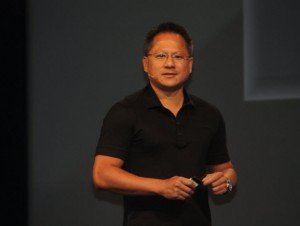Graphics chip maker Nvidia’s CEO Jen-Hsun Huang thinks Google’s Android team is pretty much the best thing since sliced bread.
Nvidia’s CEO Jen-Hsun Huang thinks Google’s Android team is pretty much the best thing since sliced bread.
Huang praised Google for its work on the Android mobile operating system on Nvidia’s earnings conference call yesterday and said Nvidia has very high expectations for the next generation of Android tablets.
Nvidia, which traditionally caters to gamers and designers with its beefy video cards, said stated in its quarterly earnings report yesterday that it plans to jam its Tegra graphics processing unit (GPU) into as many mobile devices as possible, specifically smartphones and other mobile devices running Android.
“Although they’re a little bit behind, the work that Google and Andy Rubin’s team is doing at Google is just really amazing,” Huang said on Nvidia’s earnings conference call. “I think (the next generation of Android tablets is) going to really, really surprise people and delight consumers everywhere.”
Apple has taken over the tablet personal computer market with its 9.7-inch tablet computer, the iPad. The iPhone and iPad manufacturer currently has a 95 percent market share stranglehold on the tablet space. Meanwhile, Google’s Android operating system only accounts for about 2 percent of all tablets sold.
Pretty much everyone else is now working on a tablet. Research in Motion is making a 7-inch tablet powered by the BlackBerry 6 operating system — and it’s undercutting the iPad with pricing below $500. Samsung’s 7-inch Galaxy Tab tablet, which runs on Android, is priced at an unfortunate $600 — $30 more than Apple’s cheapest 3G-enabled iPad. Hewlett-Packard is also working on an 8.9-inch tablet packing Windows 7.
It wasn’t all smiles and compliments from Huang. He said Google and tablet manufacturers weren’t picking up their game to compete with the iPad. He said that the current generation of tablets was well behind the iPad and that competitors had been slow to realize the potential of tablet computers in the face of the iPad’s success. “You can’t just put an operating system on a tablet and hope that . . . you’re going to compete against the iPad,” he said.
But the wait would be well worth it, he said.
“I think that the extra time that was necessary to build these devices, and build the operating system and all the applications and the system software necessary to do it — and obviously, we’re not going to talk about what they are right now, but they’re going to be absolutely magical,” Huang said.
VentureBeat's mission is to be a digital town square for technical decision-makers to gain knowledge about transformative enterprise technology and transact. Learn More
